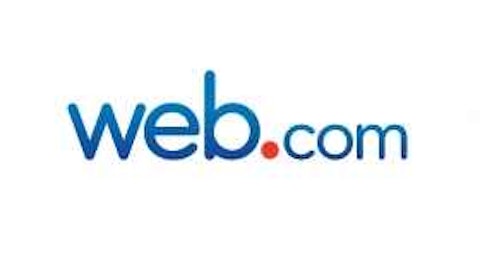Intuit Inc. (NASDAQ:INTU), a $19 billion market cap software company, offers business and financial management products for a variety of functions. It is best known for QuickBooks and TurboTax, but other products cover personal finance, payroll software, and online marketing. Year to date Intuit’s stock price is up 18%, in line with the NASDAQ index.
The company released its 10-Q for the first quarter of its fiscal year (the quarter ended in October) last month. Net revenue for the quarter was up 13%, and net losses came in considerably lower than the same period a year ago. This isn’t incredibly relevant- this is typically a soft quarter for Intuit Inc., with the majority of its earnings coming in the fiscal quarter ending in April and most of the rest coming in the fiscal quarter ending in January. It’s possible that the relatively good quarter does signal better numbers over the next several months as well, but we wouldn’t depend on that.
Intuit Inc. trades at 23 times trailing earnings, a valuation at which we’d want to see good growth on the bottom line. Wall Street analysts do see better numbers ahead: consensus is for $2.82 in earnings per share for the crucial April quarter, which would be a 12% increase from what the company earned in the same quarter of the last fiscal year. The year as a whole is expected to result in $3.33 in EPS, implying a current-year P/E multiple of 19; the forward P/E, based on earnings for the fiscal year ending in July 2014, is 17. It’s possible that Intuit will get to these improvements in earnings per share in part through buybacks: repurchasing activity has been somewhat limited recently, but the company has reported that a large buyback program is authorized and it did report about $560 million in cash, cash equivalents, and investments on its balance sheet. However, current assets were only slightly higher than current liabilities. We’d also expect Intuit to be less active in using its cash until it has its actual results from its peak quarter.
Intuit’s closest peer is H&R Block, Inc. (NYSE:HRB), with the caveat that H&R Block is more focused on professional face-to-face tax preparation while Intuit’s tax offerings are based on software for customers to complete their taxes themselves (of course, Intuit has considerable enterprise software products as well). H&R Block trades at a discount to Intuit, with a trailing P/E of 15, and also offers a dividend yield of over 4%. At first glance it might look like a better value, but we can see there being growth advantages to the software product. Analyst expectations are for earnings per share to grow 19% in its fiscal quarter ending in April- the company’s fiscal year is identical to Intuit’s- so they actually see more near term growth at H&R Block. If that’s the case, H&R Block would be a better buy but we think we’d need to research the two further before drawing any conclusions.
We can also compare Intuit to software providers SAP AG (NYSE:SAP), Adobe Systems Incorporated (NASDAQ:ADBE), and salesforce.com, inc. (NYSE:CRM). Intuit is actually at the lower end of the valuation range of this peer group: Adobe trades at 23 times trailing earnings, while SAP’s multiple is 25 and salesforce.com’s is more than 100. Growth expectations are low at the first two of these companies, and so even their forward multiples are greater than 20; while salesforce.com reported 35% revenue growth in its most recent quarter compared to the same period in the previous year, it trades very high compared to consensus earnings for next year. It’s quite possible that Intuit is the best buy of these four, as it at least has the sell-side forecasting moderate growth in the current fiscal year.






